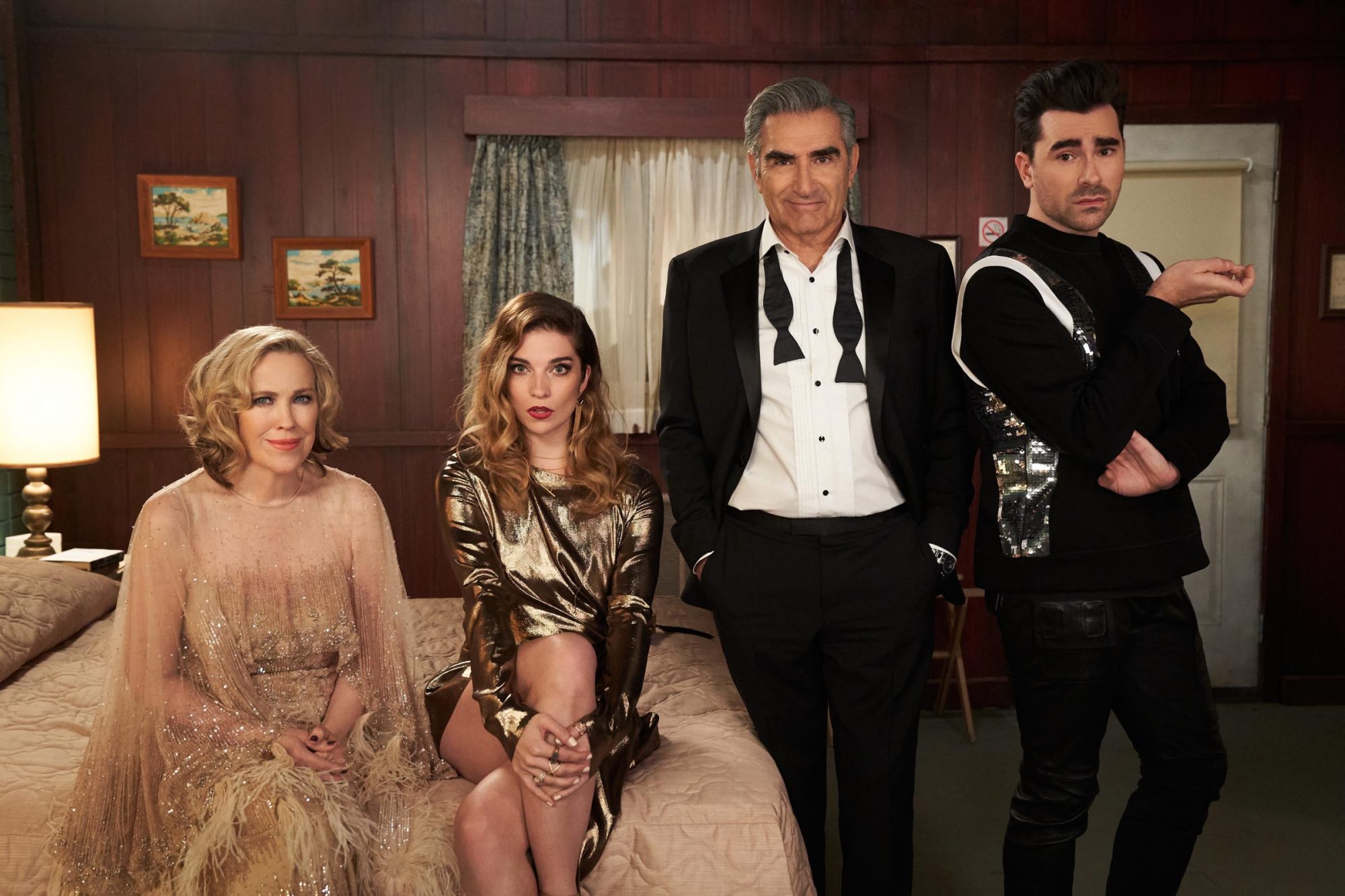Whiteness and privilege. Two words not just taught in Systemic Injustice 101, but the unlikely description behind one of television’s best shows, Schitt’s Creek. You know the premise – a wealthy white family, the Roses, lose all their money forcing them to move to a small, backwater town, Schitt’s Creek. In a time where we can all use television that is simply good, Schitt’s Creek went above and beyond. It made excellent television out of whiteness and somehow managed to restore some faith in humanity along the way.
Instead of ignoring or fearing privilege, the script and cast own their whiteness and manage to both examine and make fun of it. From the moment the IRS raids the Rose’s extravagant family home, possibly a stone’s throw from a Kardashian enclave, to their out of place designer wardrobes, their whiteness sets the scene for a family that starts out impossibly out of touch.
While Schitt’s Creek isn’t the only show starring an all white cast and handling wealth and privilege, it is the only one that dares to be self-aware, funny, and heartfelt. Other shows like Succession, The Sopranos, and even Game of Thrones focus on the underbelly of wealth and whiteness. They leave you feeling disturbed yet intrigued. Instead of heart, these shows use dark cutting humor to expose the consequences of unchecked privilege. Spoiler: it’s a cocktail of misogyny, greed, and power trips. You know the drill.
Whiteness and wealth is also the driver behind another lucrative genre, Reality TV. For decades now, the Real Housewives, Laguna Beach, The Hills, Vanderpump Rules and other reality shows have made entertainment from a similar premise of watching wealthy white people make mistakes. However the characters on these shows rarely change, which usually makes them even more hilarious. There is never a shortage of wine to throw in someone’s face or extensions to rip out – we love these characters for their dysfunction, not in spite of it. It’s a viewing experience devoid of empathy.
While the Rose family endures their share of humiliation, whether it’s Moira’s less than star quality singing or Alexis’ dance routine, Schitt’s Creek maintains a sweetness reality television doesn’t offer. The Roses are permitted to be themselves, make mistakes, and learn a lesson without losing who they are. Perhaps that’s why the show connects with its audience differently – it’s nice each character becomes a bit better while being accepted for exactly who they are.
Alexis Rose, played by Annie Murphy, is a combination of Kim Kardashian, Paris Hilton, and every Instagram influencer complete with her own single. Alexis’ problems initially seem to be centered around needing a man, but by the end of the series, she focuses on her education and starting her own business. Comparing Alexis’ relationship in the beginning with both Ted and Mud to the end of the series, we see Alexis grow more aware of herself, her wants, and the effect of her actions on others. Her connection with her brother David grows from annoyance to genuine love and companionship.
Moira, the mother of the Rose family played by the iconic Catherine O’Hara, is a refreshing motherly figure that rejects all the stereotypes associated with the role. While Moira maintains her individuality and the love of her many wigs, she grows from a self-centered socialite to a valued member of her community and a supportive parent, even if she still doesn’t know how to “fold in” the cheese.
As the father, Johnny Rose is initially distant and removed from his children. Seeing himself as a traditional provider, Johnny solves any situation with one of his meandering business anecdotes. However as the series progresses, we see more of Johnny’s sweetness with his family and especially with Alexis. While initially he forgets Alexis’ middle name, coming to Schitt’s Creek gives him the opportunity to be there for his children. After Alexis’ breakup with Ted, Johnny is able to be there for his daughter in a way that he never had before. His charming approach to fatherhood transforms him into the anchor of the Rose family. Played by Eugene Levy, a comedic legend, he exudes kindness in this role. Making it even sweeter to have him share the screen with his real life family.
With David Rose, we see him grow from a monochromatically dressed man, who has a deeper relationship to his knits than actual people, to a monochromatically dressed man who finds love but more importantly a clearer sense of self. David is one of the few if not first pansexual characters on television. Played by Dan Levy, the joy of this character isn’t just because of what it means for representation, it’s that David is allowed to be more than just the one of the firsts. When David starts dating Patrick, it’s a love story whose beauty is in its ease – there’s no bigotry or homophobia insight. Rarely do we see two men on TV fall in love, even less common is to see them fall in love organically. Too often, the way the LGBTQ community is portrayed is limiting and stereotypical but David and Patrick’s story avoids all that.
Whether it’s the famed David wine-coming-out-metaphor, Patrick’s stunning rendition of Tina Turner’s “Simply the Best,” or Moira’s connection with the JazzaGals, the characters of Schitt’s Creek connects us to themes we all crave. Not only do we love watching a hilarious white family with a propensity for the ridiculous embarrass themselves, we love to watch them grow individually and together. Schitt’s Creek reminds us that the material simply dresses up our lives – what truly matters are our relationships.
Yes, it’s unusual for me and so many other POCs to love a white show like Schitt’s Creek, but I do. There are few shows that center and debunk whiteness as well as this. Like the softest down comforter or cashmere turtleneck, the Rose family makes us all feel cozy, included, and loved. A feeling we’ve never needed more.

